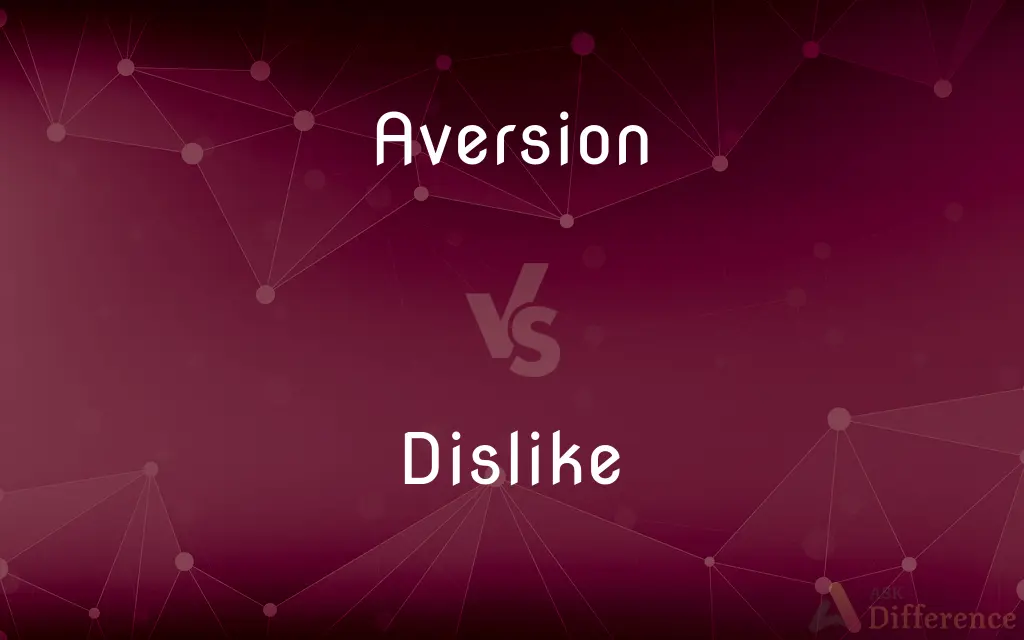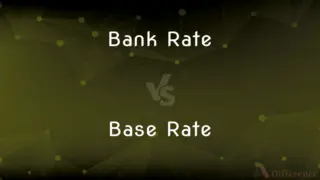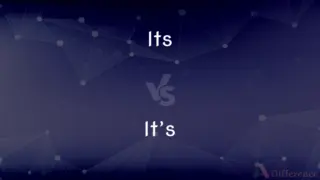Aversion vs. Dislike — What's the Difference?
By Tayyaba Rehman & Fiza Rafique — Published on October 24, 2023
Aversion refers to a strong feeling of repulsion or antipathy, while dislike is a general feeling of disfavor or antipathy.

Difference Between Aversion and Dislike
Table of Contents
ADVERTISEMENT
Key Differences
Aversion is a term that indicates a more profound sense of repulsion or detestation towards something. It's not just about not favoring something; it's about actively wanting to avoid or distance oneself from it. The intensity behind the term suggests a visceral reaction, one that might arise from deep-seated fears, traumatic experiences, or profound personal dislikes.
Conversely, dislike is more generic and can be described as a simpler form of negative feeling towards something or someone. It does not necessarily involve the urge to avoid or a strong repulsion, as aversion does. One might dislike a particular flavor or a song, but that doesn't mean they have a strong antipathy towards it.
Both aversion and dislike indicate a negative sentiment, but the degree and nature of that sentiment differ. Aversion is intense and active, often pushing the individual to act or avoid, whereas dislike is more passive, a basic unfavorable judgment or feeling without the urgency of aversion.
To capture the essence of both terms, consider this: one might have a dislike for cold weather, preferring warmer days instead. But someone with an aversion to cold might have experienced frostbite or a traumatic event in such weather, causing them to actively avoid and dread such conditions.
Comparison Chart
Definition
Strong feeling of repulsion.
General feeling of disfavor.
ADVERTISEMENT
Intensity
Stronger and more profound.
Milder in comparison to aversion.
Nature
Active avoidance or distancing.
Passive unfavorable judgment.
Root Cause
Can be deep-seated fears or traumas.
Often based on personal preferences.
Response
Can induce a visceral reaction.
Doesn't necessarily cause a strong reaction.
Compare with Definitions
Aversion
A profound repulsion towards something.
Her aversion to spiders made her scream whenever she saw one.
Dislike
A feeling of disfavor or antipathy.
She expressed her dislike for the movie's ending.
Aversion
An intense desire to avoid or stay away.
His aversion to large crowds kept him from attending concerts.
Dislike
A general aversion to something.
Many kids have a dislike for vegetables.
Aversion
A strong reaction stemming from personal experience.
The accident left him with an aversion to driving at night.
Dislike
A mild negative sentiment.
The constant noise led to her growing dislike of the neighborhood.
Aversion
A deep-seated antipathy or dislike.
She developed an aversion to meat after watching a documentary.
Dislike
To regard with distaste or aversion.
Aversion
An extreme disfavor towards something.
Due to a childhood incident, he had an aversion to water.
Dislike
An attitude or a feeling of distaste or aversion.
Aversion
A fixed, intense dislike; repugnance
Formed an aversion to crowds.
Dislike
An attitude or a feeling of distaste or aversion.
Aversion
The cause or object of such a feeling
"I jumped up, and ran out of the room ... because a newspaper writer is my aversion" (Fanny Kemble).
Dislike
Something that a person dislikes (has or feels aversion to).
Tell me your likes and dislikes.
Aversion
The avoidance of a thing, situation, or behavior because it has been associated with an unpleasant or painful stimulus.
Dislike
(Internet) An individual vote showing disapproval of, or lack of support for, something posted on the Internet.
Aversion
The act or fact of averting
The aversion of a disaster.
Dislike
To displease; to offend. In third-person only.
Aversion
Opposition or repugnance of mind; fixed dislike often without any conscious reasoning.
Due to her aversion to the outdoors she complained throughout the entire camping trip.
Dislike
(transitive) To have a feeling of aversion or antipathy towards; not to like.
Aversion
An object of dislike or repugnance.
Pushy salespeople are a major aversion of mine.
Dislike
(Internet) To leave a vote to show disapproval of, or lack of support for, something posted on the Internet.
Rebecca Black's "Friday" video has gained notoriety for being one of the most disliked videos in YouTube history.
Aversion
(obsolete) The act of turning away from an object.
Dislike
To regard with dislike or aversion; to disapprove; to disrelish.
Every nation dislikes an impost.
Aversion
A turning away.
Adhesion to vice and aversion from goodness.
Dislike
To awaken dislike in; to displease.
Aversion
Opposition or repugnance of mind; fixed dislike; antipathy; disinclination; reluctance.
Mutual aversion of races.
His rapacity had made him an object of general aversion.
A freeholder is bred with an aversion to subjection.
His aversion towards the house of York.
It is not difficult for a man to see that a person has conceived an aversion for him.
The Khasias . . . have an aversion to milk.
Dislike
A feeling of positive and usually permanent aversion to something unpleasant, uncongenial, or offensive; disapprobation; repugnance; displeasure; disfavor; - the opposite of liking or fondness.
God's grace . . . gives him continual dislike to sin.
The hint malevolent, the look oblique,The obvious satire, or implied dislike.
We have spoken of the dislike of these excellent women for Sheridan and Fox.
His dislike of a particular kind of sensational stories.
Aversion
The object of dislike or repugnance.
Pain their aversion, pleasure their desire.
Dislike
Discord; dissension.
Aversion
A feeling of intense dislike
Dislike
An inclination to withhold approval from some person or group
Aversion
The act of turning yourself (or your gaze) away;
Averting her gaze meant that she was angry
Dislike
A feeling of aversion or antipathy;
My dislike of him was instinctive
Dislike
Have or feel a dislike or distaste for;
I really dislike this salesman
Dislike
A preference against something.
I dislike wearing heavy makeup.
Dislike
An unfavorable opinion.
His dislike for the proposal was evident in the meeting.
Common Curiosities
Are aversion and dislike synonyms?
While similar, aversion is a stronger, more intense form of dislike.
Is every dislike an aversion?
No, dislike is milder and doesn't necessarily imply strong repulsion like aversion.
Can personal preferences lead to aversion?
While preferences often lead to dislikes, aversions are usually more intense and deep-rooted.
Can aversion be based on traumatic experiences?
Yes, aversion can stem from traumas or deeply negative experiences.
Can you have a mild aversion to something?
By definition, aversion is strong, but contextually, it might be used to indicate milder repulsion.
Does dislike always indicate a negative sentiment?
Yes, dislike inherently indicates a negative or unfavorable sentiment.
Is it normal to have dislikes?
Yes, everyone has dislikes based on personal preferences.
Can you have an aversion to positive events?
While uncommon, personal experiences or fears can lead to aversions to generally positive situations.
Can aversion be psychological?
Yes, aversions can be psychological, often stemming from fears or traumatic events.
Is dislike always based on personal experiences?
Not always. Dislikes can be based on personal experiences, cultural beliefs, or even genetic predispositions.
Are all aversions irrational?
No, aversions can be based on rational experiences or beliefs, though some might seem irrational to others.
Can aversions be treated?
Depending on the cause, therapeutic interventions can help treat or manage aversions.
Can societal beliefs influence dislikes?
Yes, cultural or societal norms can play a role in shaping individual dislikes.
Which is a more severe sentiment, aversion or dislike?
Aversion is more intense and severe compared to dislike.
Can dislikes evolve into aversions?
Yes, intense or repeated negative experiences can escalate dislikes into aversions.
Share Your Discovery

Previous Comparison
Bank Rate vs. Base Rate
Next Comparison
Its vs. It’sAuthor Spotlight
Written by
Tayyaba RehmanTayyaba Rehman is a distinguished writer, currently serving as a primary contributor to askdifference.com. As a researcher in semantics and etymology, Tayyaba's passion for the complexity of languages and their distinctions has found a perfect home on the platform. Tayyaba delves into the intricacies of language, distinguishing between commonly confused words and phrases, thereby providing clarity for readers worldwide.
Co-written by
Fiza RafiqueFiza Rafique is a skilled content writer at AskDifference.com, where she meticulously refines and enhances written pieces. Drawing from her vast editorial expertise, Fiza ensures clarity, accuracy, and precision in every article. Passionate about language, she continually seeks to elevate the quality of content for readers worldwide.












































